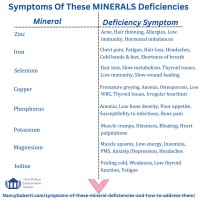
Minerals are essential micronutrients that play a critical role in maintaining the health and functionality of the human body. Each mineral contributes uniquely to various bodily processes, and deficiencies can lead to a cascade of health issues. Let’s explore the symptoms of specific mineral deficiencies, why they occur, and how functional medicine labs can help you stop guessing and start testing for optimal health.
Zinc Deficiency
Symptoms:
Acne
Hair thinning
Allergies
Low immunity
Hormonal imbalances
Low testosterone
Low libido
Zinc is essential for immune function, wound healing, and the production of proteins and DNA. A deficiency in zinc can compromise your body’s ability to repair itself and fight infections. Additionally, zinc plays a role in maintaining skin health and balancing hormones, which is why its deficiency is often associated with acne and hormonal imbalances.
Iron Deficiency
Symptoms:
Chest pain
Fatigue
Hair loss
Headaches
Cold hands and feet
Shortness of breath
Iron is a critical component of hemoglobin, which transports oxygen throughout the body. Without sufficient iron, your tissues and organs do not get the oxygen they need to function properly, leading to fatigue and other symptoms. Prolonged deficiency can result in anemia, which can have serious health implications.
Selenium Deficiency
Symptoms:
Hair loss
Slow metabolism
Thyroid issues
Low immunity
Slow wound healing
Selenium is a powerful antioxidant that helps protect your body from oxidative stress. It is also vital for proper thyroid function and metabolic regulation. Low selenium levels can impair your immune system and slow down recovery from illnesses and injuries.
Copper Deficiency
Symptoms:
Premature greying
Anemia
Osteoporosis
Low white blood cell (WBC) count
Thyroid problems
Irregular heartbeat
Copper is involved in the production of red and white blood cells, bone health, and cardiovascular function. A deficiency can lead to symptoms that mimic other conditions, making it crucial to identify and address it accurately.
Phosphorus Deficiency
Symptoms:
Anemia
Low bone density
Poor appetite
Increased susceptibility to infections
Bone pain
Phosphorus is necessary for the formation of bones and teeth, as well as energy production. A deficiency can weaken your skeletal structure and compromise your overall health, leaving you more prone to infections and fatigue.
Potassium Deficiency
Symptoms:
Muscle cramps
Dizziness
Bloating
Heart palpitations
Potassium is an electrolyte that supports nerve function, muscle contractions, and heart health. A deficiency can disrupt these processes, leading to uncomfortable and sometimes dangerous symptoms such as heart palpitations and dizziness.
Magnesium Deficiency
Symptoms:
Muscle spasms
Low energy
Insomnia
PMS
Anxiety/Depression
Frequent headaches
Magnesium is often referred to as the “relaxation mineral” because of its role in calming the nervous system and supporting muscle relaxation. It is also crucial for energy production and mental health. Low levels of magnesium are linked to mood disorders, sleep issues, and chronic headaches.
Iodine Deficiency
Symptoms:
Feeling cold
Weakness
Low thyroid function
Fatigue
Iodine is essential for thyroid hormone production. Without adequate iodine, the thyroid cannot function optimally, leading to symptoms like fatigue, weight gain, and sensitivity to cold. Prolonged iodine deficiency can result in goiter and other thyroid-related disorders.
The Importance of Identifying Deficiencies
Symptoms of mineral deficiencies often overlap, making it difficult to pinpoint which nutrient is lacking without proper testing. For example, fatigue can result from low iron, magnesium, or iodine levels, among others. Guessing which deficiency you have can lead to improper supplementation and potentially exacerbate your condition.
Functional medicine labs provide comprehensive testing to accurately identify your mineral levels. These labs use advanced diagnostic tools to measure your nutrient status, uncover hidden deficiencies, and offer actionable insights tailored to your unique needs.
Functional Medicine Labs: A Personalized Approach to Health
Functional medicine labs go beyond conventional testing to offer a deeper understanding of your body’s biochemistry. By identifying nutrient imbalances and deficiencies, they help you:
Prevent Chronic Diseases: Correcting deficiencies early can reduce your risk of developing chronic conditions like osteoporosis, cardiovascular diseases, and metabolic disorders.
Optimize Energy Levels: Addressing deficiencies ensures your body has the raw materials it needs to produce energy efficiently.
Enhance Immunity: Minerals like zinc and selenium are crucial for immune function. Testing can reveal whether you need to boost your intake.
Support Mental Health: Deficiencies in magnesium, iodine, and other minerals are often linked to mood disorders. Testing can help you regain emotional balance.
Improve Digestive Health: Minerals like potassium and magnesium are essential for muscle contractions in the digestive tract. Testing can provide insights into gut health issues.
If you’re experiencing symptoms like fatigue, hair loss, muscle cramps, or hormonal imbalances, it’s time to stop guessing and start testing. Functional medicine labs offer a precise and personalized approach to understanding your body’s needs. By uncovering and addressing mineral deficiencies, you can take proactive steps toward better health and well-being.
Don’t let vague symptoms hold you back from living your best life. Invest in your health today by consulting with a functional medicine practitioner and getting the tests you need to identify and correct your mineral deficiencies.
Tags: functional medicine lab testing, iodine, lab training, magnesium, mental health, Nancy Guberti, potassium, Symptoms of Mineral Deficiencies, total wellness, Total Wellness Empowerment Institute
Leave A Reply (No comments So Far)
No comments yet